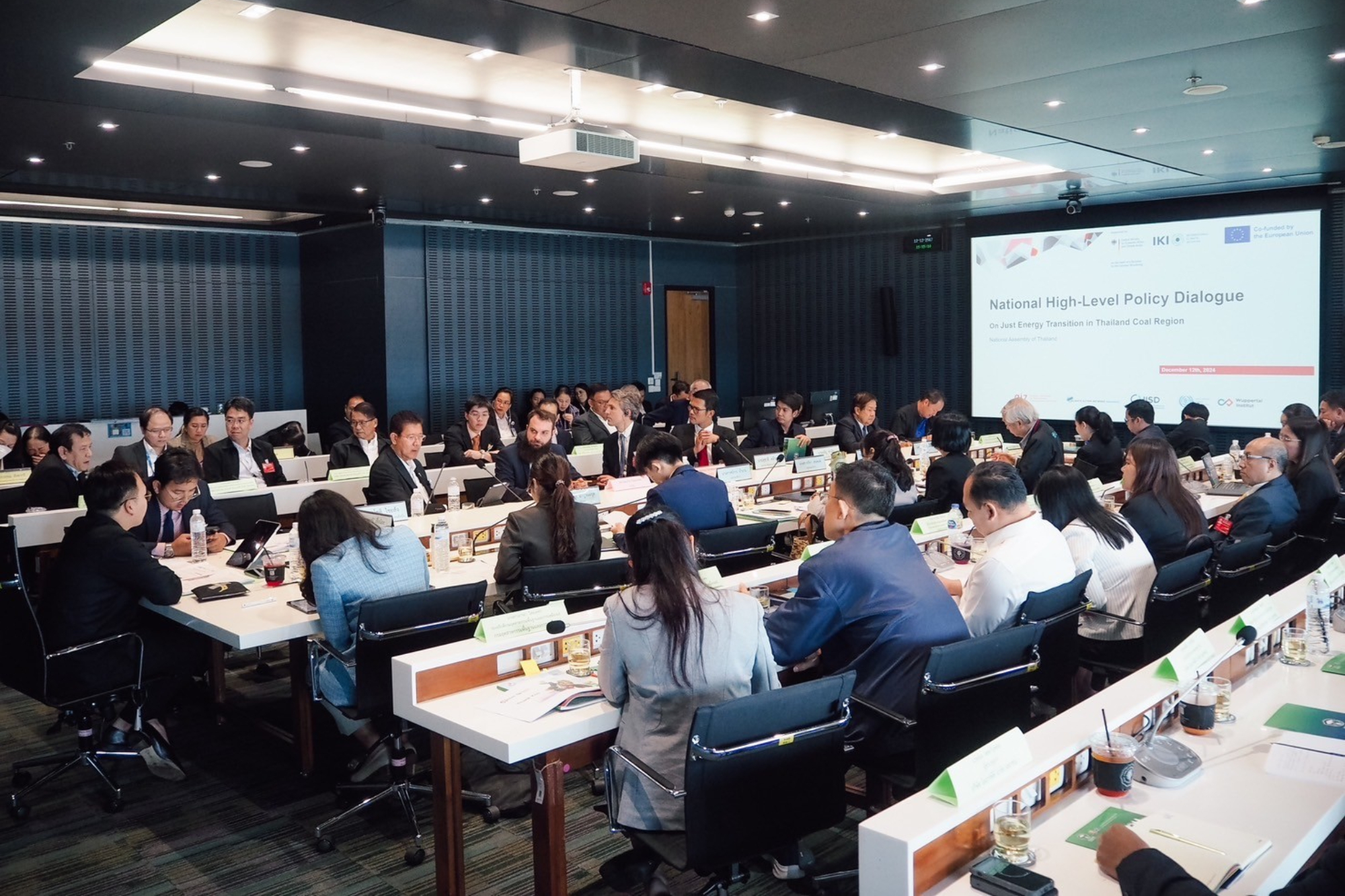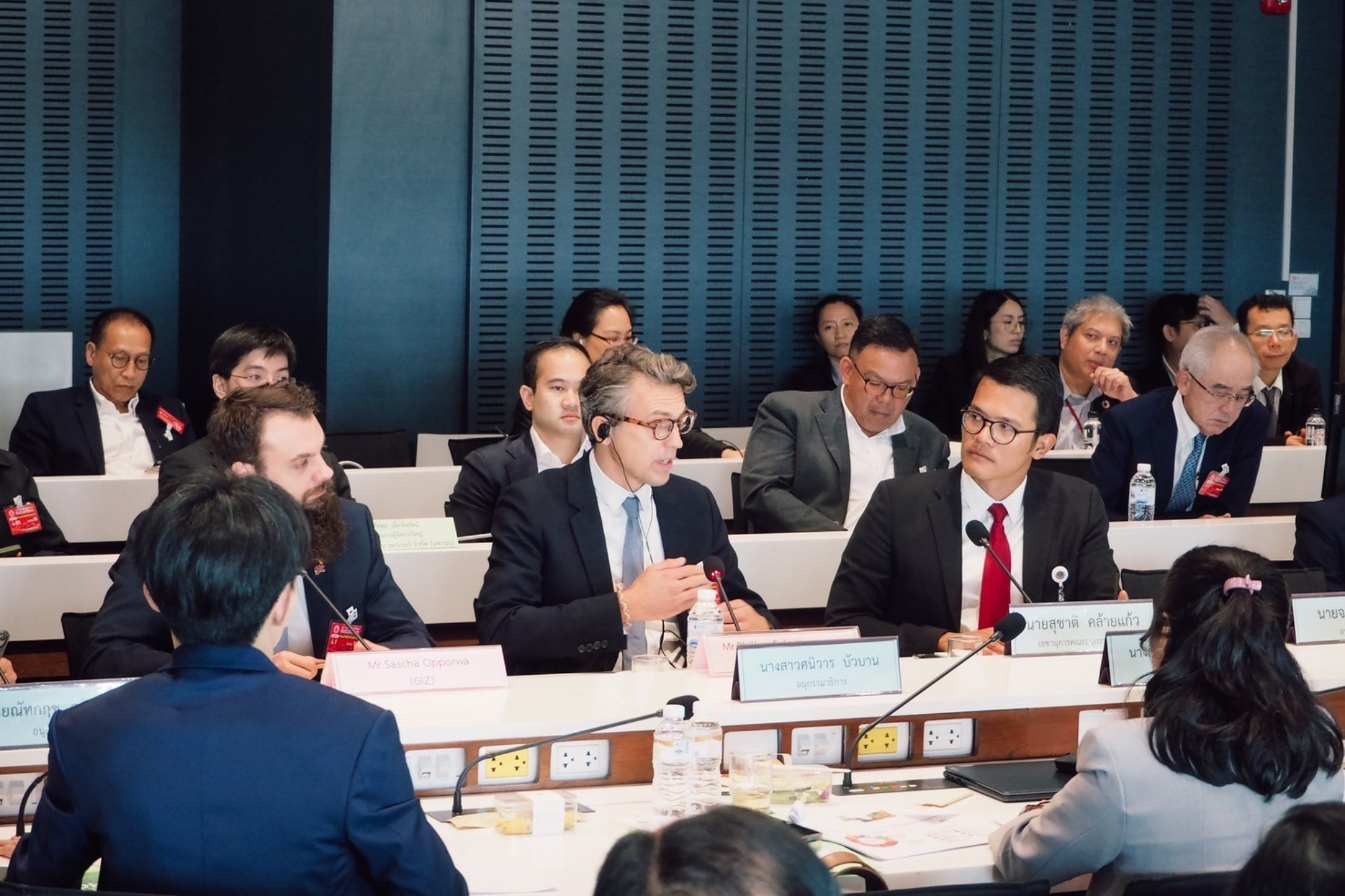Assessment and Status Report on Just Energy Transition in Thailand
With a focus on the Lampang district, this study assesses the current situation regarding a...

On December 12, 2024, a National High-Level Policy Dialogue on the Just Energy Transition in Thailand’s Coal Regions took place in Bangkok to support key coal region stakeholders in planning and implementing a just transition to a low-carbon energy system.
The policy dialogue served as a platform for sharing national, regional, and sub-regional experiences and lessons learned during the phase-out of coal, with a particular focus on the challenges and solutions related to ensuring a just transition in Thailand. Held at the National Assembly in Bangkok, the event was jointly organised by the Innovation Regions for a Just Energy Transition (IKI JET) project and its partner the Electricity Generating Authority of Thailand (EGAT), alongside Climate Parliament and the Standing Committee on Energy (part of the House of Representatives of Thailand).
A diverse group of stakeholders participated in the dialogue. They included speakers from EGAT, the Thai Energy Policy and Planning Office (EPPO), the Energy Regulatory Commission (ERC), the Ministry of Industry, and the National Higher Education, Science, Research, and Innovation Policy Council.
The private sector was well represented by major companies such as the Italian-Thai Development, Siam Cement Group (SCG), Banpu, IRPC, TPI Polene Power, Global Power Synergy, and Electricity Generating.
In addition, regional stakeholders, including the Saraburi and Lampang provincial industrial councils, as well as key government agencies such as the Customs Department, the Department of Industrial Works, the Department of Mineral Fuels, the Revenue Department, and the Department of Primary Industries and Mines, were actively involved. The Thai Cement Manufacturers Association, civil society organisations (CSOs), non-governmental organisations (NGOs), academics, and nearly 80 other participants also contributed to the dialogue.

Hans-Ulrich Sudbeck, Deputy Head of Mission and Head of Economic Department at the German Embassy in Thailand, stressed the importance of approaching the just energy transition on three critical levels: international cooperation; national frameworks and legislation; and on-the-ground implementation.
Timo Menniken, Deutsche Gesellschaft für Internationale Zusammenarbeit (GIZ) Country Director for Thailand, reinforced this view, emphasising that a collaborative approach across all levels is crucial for achieving a successful and equitable energy transition in Thailand and beyond.
Supachot Chaiyasart, Vice Chairperson of the Energy Committee, highlighted that the discussions would address three key components of the energy transition. “You will hear examples of how the efforts of the Climate Parliament, state-owned enterprises, and the private sector intersect with on-the-ground implementation,” he said. He also stressed the importance of national frameworks in enabling cooperation and successful implementation in coal regions.
Additionally, Chaiyasart introduced the concept of green zones in Lampang, aimed at attracting investment to coal regions. Green zones focus on strategic location, connectivity, and risk reduction, with a key emphasis on engaging local communities in the green transition and learning from existing renewable energy and industrial zones.
Philipp Schattenmann, Director of the IKI JET project at GIZ, further emphasised the initiative’s role in uniting seven countries and their coal regions to advance a just energy transition. He stressed the project’s global outreach, bringing together practitioners and stakeholders worldwide, as demonstrated by the ongoing policy dialogue. “Knowledge sharing is central to our interregional platform, as we recognise the value of learning from past experiences,” he said, underscoring the importance of dialogue and the new economic opportunities that lie ahead.
The dialogue aimed to deepen stakeholders’ understanding of the economic, social, and governance instruments being used to accelerate the early retirement of coal-fired power stations in Thailand. It also aimed to strengthen networks of organisations and experts supporting the process of phasing out coal at the national, regional, and sub-regional levels.

The dialogue explored how regional cooperation and peer learning could help accelerate the process. It also presented current just energy transition initiatives in IKI JET partner countries—Chile, Colombia, Indonesia, Mongolia, South Africa, and Vietnam—highlighting challenges, best practices, and experiences in implementing just transitions.
Suchart Charles Klaikaew, Project Lead for IKI JET Thailand, outlined key activities being undertaken as part of the country’s just energy transition. His presentation, Coal Phase-Down by the Numbers, provided an analytical overview of Thailand’s coal sector. He highlighted IKI JET’s technical assistance in the Mae Moh region, including with green jobs training, a Regional Just Transition Plan, coal mine closure strategies, repurposing post-mining areas, and retrofitting Mae Moh’s coal power plants to enhance flexibility in power generation. He also addressed the significant challenges posed by continued coal use in the private sector, emphasising the need for a coordinated approach to accelerating the transition and reducing dependence on coal in Thailand’s energy mix.
Thailand’s Mae Moh Smart City 2024 initiative, part of the Mae Moh Green Model, was highlighted as a critical step in the country’s energy transition.
Suchart Tunkaew, EGAT’s Assistant Governor for the Mae Moh mine, highlighted Thailand’s commitment to a greener future through the Triple S strategy—sources transformation (increasing the share of renewable energy in the energy mix), sink co-creation (enhancing CO2 absorption), and support measures mechanisms (supporting projects that offset or avoid carbon emissions). Developed in collaboration with GIZ, this strategy aims to reduce the country’s dependence on coal while ensuring a fair and equitable energy transition. The Mae Moh Green Model is a cornerstone of this approach, integrating renewable energy sources such as biomass, solar, and future fuels like hydrogen, alongside advanced carbon capture and storage (CCS) technologies.
A key aspect of the Mae Moh Green Model is its focus on community-centric development. EGAT has introduced sustainable agricultural practices in the Mae Moh region to promote economic self-reliance, offering a holistic approach that balances environmental, economic, and social benefits. This model serves as an example for other coal-dependent regions in Asia and demonstrates the importance of involving local communities in the transition to renewable energy.
Overall, the Mae Moh Green Model not only reflects Thailand’s commitment to a sustainable energy future but also sets a precedent for other nations in the region. As Asia continues to confront the challenges of climate change and energy security, initiatives like this provide a roadmap for achieving a just and equitable transition away from fossil fuels.
Suchart Charles Klaikaew is program lead at IKI JET in Thailand and Deutsche Gesellschaft für Internationale Zusammenarbeit (GIZ) GmbH.
Receive updates on just energy transition news, insights, knowledge, and events directly in your inbox.